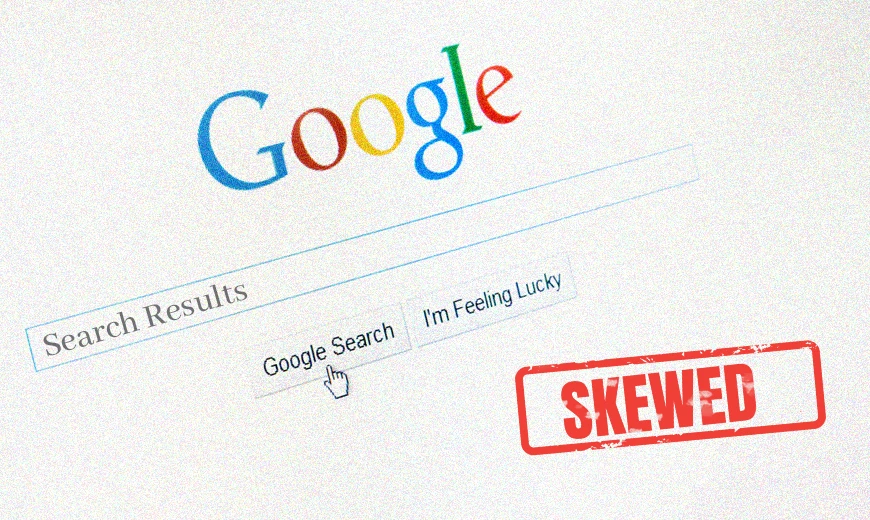
Share :
Search engines such as Google have become firmly engrained in our lives, allowing quick access to information with a few clicks. However, greater dependence on search engines and artificial intelligence to select results increases the potential of bias, disinformation, and even censorship to slip in undetected.
Recent research identified problems in Google’s featured response boxes, which try to offer straight answers to search queries at the top. In other situations, the investigation discovered that highlighted replies supplied factually incorrect or unsupported material, skewing the search results.
This highlights a larger concern with AI dependency in search algorithmic bias. How can an AI system designed to tap from huge information present inaccurate featured answers? What additional search engine biases exist that consumers should be aware of?
How Featured Answers and Search Algorithms Can Go Awry?.

Google’s prominently displayed responses at the top of search results are created algorithmically using extractive question-answering models that analyze web pages relevant to the search query. The model selects the most relevant straight-answer passage to showcase.
However, abstraction-based AI does not fully comprehend the semantic context and lacks human judgment. Over-optimization to offer direct responses rapidly might result in the model making factual mistakes or interpreting query terms too literally without checking against evidence.
For example, to a search query about avocado hand injuries, Google falsely answered that such injuries are permanent – displaying this prominently atop results without checking the underlying claim. In another case, when asked “when did the dinosaurs die out?” it stated dinosaurs died out in the 1950s rather than 65 million years ago.
Clearly, blind AI confidence in providing quick answers failed to fact-check. But aside from featured answers, search algorithms carry other ingrained biases.
Advertising Impact on Organic Search Results
Google search is free not for charitable reasons, but because people are its product. Search results are extensively optimized to provide consumers with the most relevant and high-quality information in order to keep them on Google. However, advertising interests complicate this aim because search engines are large businesses that rely on selling adverts.
Specifically, studies show that the top 1-3 organic search results receive much more traffic, making ranking critical for exposure. This exacerbates conflicts of interest in running the largest search advertising firm.
Does the increased advertising income motivation cause organic results to favor advertisers or Google properties? It is difficult to establish definitively, yet significant suspicions exist. The EU even penalized Google for allegedly demoting competitors in shopping searches. Critics argue that advertising presumably get an edge in ranking algorithms.
Filter Bubbles and Personalization
Modern search engines tailor and filter content to users’ preferences and social circles, as evidenced by their browsing history, likes, clicks, friends, and locations. AI-guided customization aims to provide the most relevant results to each user.
However, detractors point out the dangers of filter bubbles and opinion polarization if competing ideas are repressed, limiting serendipity in intellectual discovery. Customization can lead to confirmation bias loops, as AI repeatedly tells consumers what it wants them to hear in order to increase engagement, restricting balanced exposure.
Is tailored search isolating individuals in bubbles by suppressing contrary results, rather than promoting intellectual variety and open-mindedness? Personalization algorithms are still struggling to determine actual relevance in the face of over-customization.
Censorship and Manipulation
Geopolitics, societal conflicts, and political coercion all put pressure on search businesses to regulate and suppress material that they believe is unpleasant, sensitive, harmful, or contrary to their principles. Hate speech, pornography, piracy, extremism, catastrophes, and political opposition are some of the most commonly blocked search terms.
However, censorship may readily become politically and ethically relative. Critics argue that by blacklisting phrases like “protest” or pro-democracy voices, Google gives in too easily to authoritarian demands from oppressive governments ranging from Russia to China to Turkey. This censoring creep threatens intellectual freedom.
Furthermore, disinformation spreaders take use of search algorithms. Click farms and cloaking tactics artificially boost game ranks. Malicious actors or repressive governments also pay online reputation management organizations to artificially boost pages that whitewash human rights breaches in search results, raising accountability concerns.
While the reasons for censorship demands and manipulation may appear reasonable on their own, giving private profit-seeking companies the ability to tightly control access to information on the internet raises serious social responsibility and accountability concerns about transparency and due process.
The Quest for Neutral, Fair, and Representative Search
Ideally, search engines serve as neutral referees, linking users to the most accurate, reputable information while also expressing varied viewpoints relevant to searches with minimum prejudice or conflicts of interest. An admirable goal, but a hefty task.
Utopian goals face economic and geopolitical reality, but algorithmic techniques lack human ethics and judgment. Biases remain as a consequence of economic interests, advertising income, opaque customization, censorship regulations, disinformation gaps, and pressure campaigns by parties seeking to manipulate or distort search results.
Mitigating remedies such as tighter control, audits, explainability standards, external appeals processes, anti-manipulation detection, and systems to foster intellectual diversity all have benefits, but also drawbacks in terms of size, oversight, and execution feasibility.
In reality, there are probably no ideal answers. There are several trade-offs between relevance, openness, accountability, and resistance to misuse. However, identifying and investigating questions of algorithmic authority over information is critical, lest blind trust give amoral robots too much influence over minds and society.
In the interim, awareness, and transparency around potential search engine pitfalls enable users to click critically, question sources, check credibility, examine multiple results, and avoid filter bubbles. An informed, empowered, and judicious public remains the best bulwark as search commands ever greater sway over discourse and worldviews in the information age. Blind trust can have unintended consequences.
Promoting Algorithmic Transparency and Accountability
Given the inherent limits of totally eradicating bias from search algorithms designed primarily for relevance and engagement, relying solely on automated curation is risky. To mitigate the harm caused by algorithmic control over knowledge, search engines must be more transparent and accountable.
Useful approaches include:
Open Algorithm Audits – Independent audits of search code, rankings, rules, and results data may reveal flaws. However, firms regard algorithms to be key intellectual property. Limited voluntary attempts, such as Bing’s Online Algorithmic Transparency Center, appear.
Explainability to Users – Transparency surrounding important data signals that affect each user’s search results allows us to question algorithmic reasoning rather than blindly trusting it. Google does this in part by emphasizing the influence of personalization on suggestions and providing links to Search operators for query customization. More granularity may help.
Internal Oversight – Maintaining diverse internal review boards, including disagreeing voices, to compare algorithms, regulations, automatic takedowns, and other essential firm actions to ethical policies promotes self-regulation. However, oversight independence is still questionable.
Whistleblower Policies: Corporations incentivise responsible internal exposure of unethical behavior. True safety for whistleblowers who report concerns in opaque algorithms, however, is critical, as are guarded avenues for them to securely access media and officials.
None provide silver bullet solutions to specific biases, but layered transparency and accountability methods improve search quality and algorithmic fairness, hence increasing public confidence.
Conclusion
The importance of search engines in curating knowledge and information access in the digital era gives algorithmic systems enormous power over society and individual worldviews. This power carries the potential of propagating prejudice, disinformation, polarization bubbles, opaque censoring practices, and commercial conflicts of interest that influence findings.
Mitigating the hazards associated with algorithmic control over access to information while retaining relevance, diversity, and resistance to malevolent manipulation requires a delicate balancing act with extremely high stakes for truth and openness.
There are likely no ideal methods for ensuring impartial search at scale when many data signals are combined to infer relevance amidst competing stakeholder interests. However, publicly identifying difficulties, rigorously evaluating solutions, and keeping human values core to algorithmic monitoring provide productive routes to ensure that knowledge and power stay balanced between man and machine as search queries penetrate deeper into people’s lives.
After all, the most potent check against disinformation or suppression is diligent individuals who are always eager to explore the algorithmic logic that serves information to society in a transparent and accountable manner. Shafts of light assist ensure that search algorithms designed to meet human knowledge demands do not wind up commanding brains.


